Pat Parelli says you must be “mentally, emotionally and physically fit” to handle horses. I would argue that many people who aren’t physically fit can do a lot with horses. To me the bottom line is energetics. The horse recognizes the energy in the person, and will respond to that.
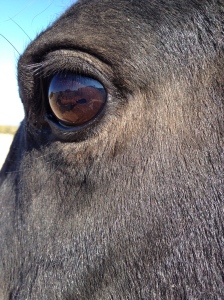 The mental part is really not much at play in the work with the horses, in my opinion. The intellect often gets in the way of us feeling. I encourage people to get into their bodies by doing a series of exercises, and bring the people back to these exercises and an awareness of what is happening as they are working with the horses. The biggest factor in horse work is change in the people. Because horses respond best to authenticity, it means really looking at what is going on in ourselves. That’s why it isn’t the smartest, most emotionally sound (by outside standards), physically fit people who are most effective with horses. There are people with deep emotional problems who do well with horses, but generally not those who are trying to get the horse to fill in for some lack they have in themselves.
The mental part is really not much at play in the work with the horses, in my opinion. The intellect often gets in the way of us feeling. I encourage people to get into their bodies by doing a series of exercises, and bring the people back to these exercises and an awareness of what is happening as they are working with the horses. The biggest factor in horse work is change in the people. Because horses respond best to authenticity, it means really looking at what is going on in ourselves. That’s why it isn’t the smartest, most emotionally sound (by outside standards), physically fit people who are most effective with horses. There are people with deep emotional problems who do well with horses, but generally not those who are trying to get the horse to fill in for some lack they have in themselves.
Notice that horses will recognize when people are not physically fit or are small like children. They may behave differently around them, just as my horses were aware that I was not strong after I had an injury. They didn’t immediately try to take over and dominate, they were sensitive to what my needs were and what I could and could not do.
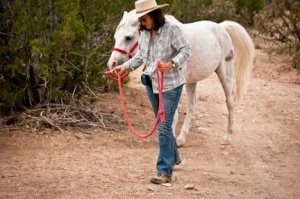 Horses will respond to physical dominance with fear but not necessarily respect. They are very susceptible to emotions, but they prefer that people are authentic in their emotions. They will respond better to the authentic person who is in his body than to the intellectual or powerhouse strategic thinker-type person. The person who is a high level, influential manager at a big corporation is not necessarily well equipped to work with horses.
Horses will respond to physical dominance with fear but not necessarily respect. They are very susceptible to emotions, but they prefer that people are authentic in their emotions. They will respond better to the authentic person who is in his body than to the intellectual or powerhouse strategic thinker-type person. The person who is a high level, influential manager at a big corporation is not necessarily well equipped to work with horses.
You know that certain methods are effective because horses are herd animals and can be managed by force and coercion, but our best results come from creating a community of non-resistance with horses. This way the horse can have choice in the matter, and not feel like a lesser being.
Although it may seem impossible at times, people can change. Think about the way you were ten years ago compared with how you are now. What has changed? What do you like about yourself? I fully believe that getting in your body is a vital path to change. Receiving bodywork can help this happen, doing various awareness exercises that bring you into your body can also be extremely effective. That is why we do these in my clinics. I can’t do bodywork on everyone in the class, but I can show some exercises that will ground you, make you aware of your dimensions, give you a greater sense of your whole being, and get fear to dissolve. We work on how to breathe, and how to enter the space with the horse so you are clear first.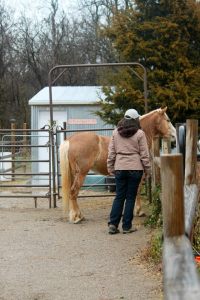
These exercises not only help us develop our own awareness, but extend to the awareness of horses. We are better able to gauge how they are in their bodies, where they may put their feet, what they need from us, how we may better help them in training. From this, their awareness of us will grow and expand.
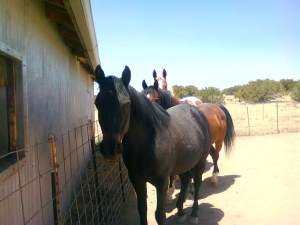 Accidents occur because we are not in the present moment, and we are thinking of something else. They also occur because horses are large animals with a strong flight reflex. We work to defuse the flight reflex while staying in the present moment, to have the best possible outcome.
Accidents occur because we are not in the present moment, and we are thinking of something else. They also occur because horses are large animals with a strong flight reflex. We work to defuse the flight reflex while staying in the present moment, to have the best possible outcome.
Here is one sample exercise: before going out to your horse, feel your center line, all the way from the top of your head down to your feet. You can also extend it out the top of your head. If you concentrate on the top of your head, what do you feel like? Do you feel grounded? Then move your focus down to your feet, and then deep into the ground as though your feet extended that far. Do you feel more grounded then? Pick the option that makes you feel more grounded and go out to work with your horse.
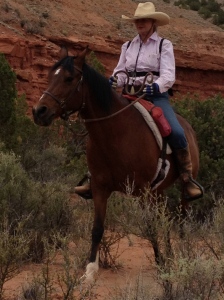 We also need to have an awareness of all our dimensions, not just up and down. When you watch horses, they are aware of everything going on around them. Some horses get some of their dimensions shut down because of the way they have been handled, but a healthy horse will have all his dimensions intact. He will also know how to approach other horses and how to interact. We can learn a lot from horses to apply to our relationships with people also.
We also need to have an awareness of all our dimensions, not just up and down. When you watch horses, they are aware of everything going on around them. Some horses get some of their dimensions shut down because of the way they have been handled, but a healthy horse will have all his dimensions intact. He will also know how to approach other horses and how to interact. We can learn a lot from horses to apply to our relationships with people also.
All in all, by doing this we develop a different kind of intellect, a knowing, that is greater than our own intelligence. Why is it that horses can feel things through the earth, feel currents in the air, feel and respond to many things that are unseen, that we are clueless about? That is their world, that is how they survive in the wild. To know horses and really form good relationships, is to know something of this sensitivity and the language that passes between them. They recognize our efforts at developing our sensitivity and just like people in other countries who do not speak our language, they will welcome our efforts to attempt to communicate!
We will be doing some of these awareness building exercises at our clinic in September near Oklahoma City – see details below!
Services: Bodywork (Ortho-Bionomy for people, Equine Positional Release/Equine Ortho-Bionomy): private sessions, tutorials, phone consultations, distance healing and gift certificates
Liberty Training: clinics, mini-clinics, workshops, private and semi-private sessions, tutorials, consultations: by appointment: 505.501.2478 or emailing susansmith@orthohorse.info
Now offering “Some Don’t Like It Hot” Liberty Training morning two-three hour-sessions over the summer for two-three people at a time, taking advantage of the cool hours. Tell a friend and get to experience liberty work together!
Liberty Foundations Waterhole Rituals Equine Clinic at Spirit Horse Ranch near Oklahoma City, co-teaching: Ruella Yates, Certified Carolyn Resnick Trainer and Susan Smith, Suggested CR Trainer. Liberty Horse Training. September 28-29, 2013. Contact Ruella Yates at ruella@libertyfoundations.com, or 405-771-4274.



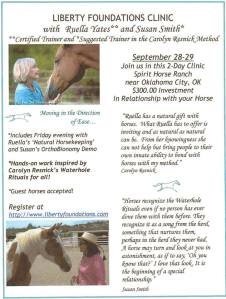
You have hit the nail on the head, Susan! Horses look for congruency in humans, not how physically fit they are, just as an example. Many of my clients are older people who don’t have the physical ‘edge’ they once had; this makes no difference at all to horses. They’re not concerned with that at all; they want to know who you are. I look forward to teaching with you September 27/28/29 at my ranch near Oklahoma City, and invite your readers to come join us! (Shameless promotion of our clinic, I know!)
Sometimes I practice my Qigong in the pasture with the horses. they come right over to see what I’m doing and are truly fascinated when I make a huge exhale of breath. they stretch their necks out and snort at it. then we all laugh, you know how some horses do!
I’ll bet they really love that, Deb, and you are piquing their curiosity at the same time!
I agree that we don’t have to be a fitness guru to be with horses, but having been fit and then NOT, I can tell you it’s easier to do everything you need to do if you ARE fit.
I also think the mental fitness we talk about, isn’t so much what we think and analyse, it’s more an ability to let go of thought and be able to quiet the mind. Once the mind is quiet, and the body is quiet, and the spirit is open, THEN we can learn and draw from the horse what we need to know to be a part of the herd. And we can be more congruent as mentioned. Horses know more than we give them credit for and I don’t buy into any ONE method by any ONE instructor/practitioner. Each and every person, animal and situation can teach us so much if we open ourselves to the lesson and become “student”
Yes, it is easier to work with horses if you are fit, but I will always remember Ray Hunt teaching a class from the cab of his semi after he was no longer able to sit astride a horse. I don’t think anyone would say Ray was less of a horseman because he couldn’t do what he used to be able to do. His legacy is timeless. He also said that he could teach a lot of people a lot of things, but there was something he couldn’t teach them and he didn’t know what that was. I try to explore that “unknown” piece, and I don’t care what method or instructor has the answer.
I think what Pat talks about maybe a bit different than what you represent – Pat’s son Caleb has some real physical difficulties (cerebral palsy) and works closely with Pat and Linda. Also, one of Pat’s top students is in a wheelchair. Pat talks very specifically about emotional energy – and using that in all phases of horse relationship. I don’t think I have consumed the “Parelli kool-aide” but I have studied the Parelli way, alot, and find it fantastic!
I think each clinician formulates what they can teach the best, and that’s why we have so many clinicians with their own take on things. I work with horses and teach from an energetic place, and I talk about being “in your body” which means that then you can come forward from an authentic place. Our emotions are not a good place to work horses from, in my experience.
when pat talks about being mentally fit he is not saying we need to be rocket scientists or smarter than the average bear 😉 he is saying that we need to let go of our emotional and mental baggage and be in the moment with the horse. of course being physically fit when starting young horses is very helpful, but he does have the information that can help those that aren’t so physically fit manage just fine. he won’t turn you away because you are older, fatter or in a wheelchair by any means! it’s best to be free of our emotions when being around horses because when we are feeling frustrated, sad, angry, etc, we can be difficult to read, which in turn causes us to seem like unconfident leaders. a horse will not follow an unconfident leader.